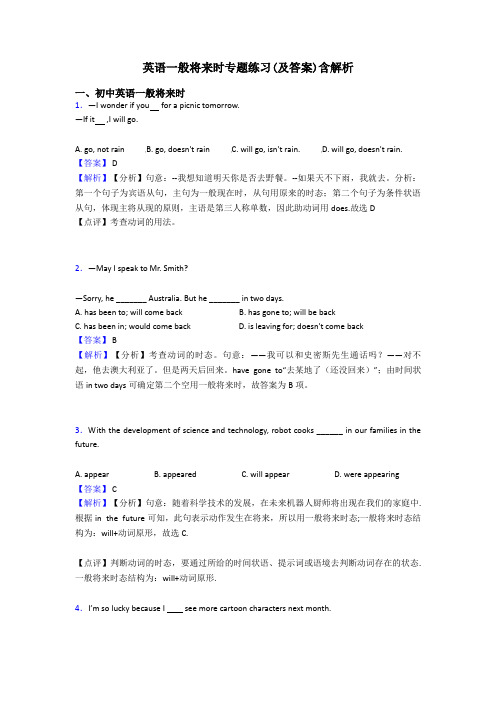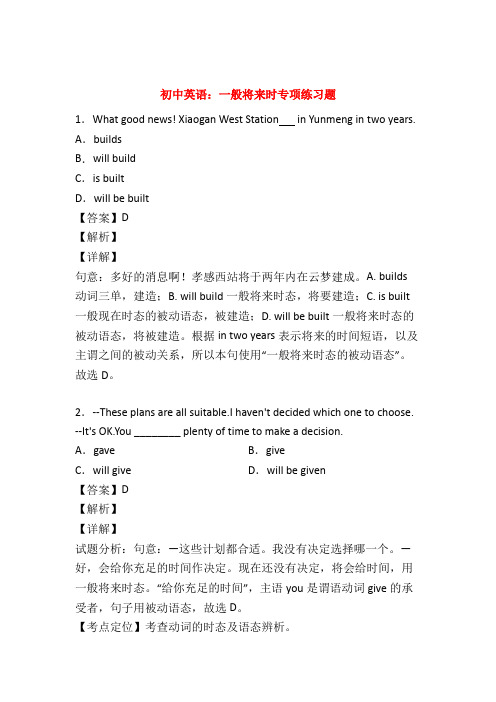一般将来时用法及专项练习
- 格式:docx
- 大小:21.63 KB
- 文档页数:4

一般将来时练习题及答案一般将来时(附练习题及答案)一般将来时(The future indefinite tense)一般将来时主要有以下几种表现形式:由助动词shall或will加动词原形构成,shall 用于第一人称,will 用于第二、三人称。
除英国外的说英语的国家,在陈述句中,即使在第一人称一般也用will,在英国也有这种趋势。
在口语中,常用shall, will的缩写形式为‘ll, 如:I‘ll, you‘ll 等。
Shall not的缩写式为:shan‘t, will not 的缩写式为:won‘t.肯定句:I/We shall/will go.You/He/She/They Will go.否定句:I/We shall/will not go.You/He/She/They Will not go.疑问句:Shall I/we go?Will you/he/she/they go?什么叫做一般将来时(1)一般将来时表示将要发生的动作或情况。
例如:I will(shall) arrive tomorrow.我明天到。
Will you be free tonight? 你今晚有空吗?We won‘t (shan‘t) be busy this evening. 我们今晚不忙。
(2)在一般将来时的句子中,有时有表示将来时间的状语,有时没有时间状语,这时要从意思上判断是否指未来的动作或情况。
例如:Will she come? 她(会)来吗?We‘ll only stay for two weeks. 我们只待两星期。
The meeting won‘t last long. 会开不了多久。
(3)在以第一人称I或we作主语的问句中,一般使用助动词shall,这时或是征求对方的意见(a),或是询问一个情况(b):a. Where shall we meet? 我们在哪儿碰头?b. Shall we have any classes tomorrow?明天我们有课吗?在这类问句中,近年来也有不少人用will,特别是在美国。

六年级英语-一般将来时(含练习题)一般将来时一、概念:表示将要发生的动作或存在的状态及打算,计划或准备做某事,句中一般有以下时间状语:tomorrow、next day(week、month、year)soon。
the day after tomorrow(后天)等。
二、基本结构:1、be going to +do2、will +do三、否定句:在be动词后面加not或情态动词will后加not 成won' t列如:I'm going to have a XXX改为:I'm not。
going to have a picnic this afternoon.四、一般疑问句: be或will提到句首,some改为any;and改为or第一、二人称互换。
XXX:We are going to go on outing this XXX.改为:Are you going to go on outing this weekend?五、对划线部分提问: 一般情况,一般将来时的对划线部分有三种情况。
1、问人:who列如:I'm going to new York soon改为:Who's going to new York soon?2、问干什么:what…。
do如:XXX is going to。
watch a race with me this afternoon 改为:What is your father going to do with you this。
afternoon?3、问什么时候:when列如:She's going to go to bed at nine 改为:When is going to bed?六、同义句:。

英语一般将来时专题练习(及答案)含解析一、初中英语一般将来时1.—I wonder if you for a picnic tomorrow.—If it ,I will go.A. go, not rainB. go, doesn't rainC. will go, isn't rain.D. will go, doesn't rain.【答案】 D【解析】【分析】句意:--我想知道明天你是否去野餐。
--如果天不下雨,我就去。
分析:第一个句子为宾语从句,主句为一般现在时,从句用原来的时态;第二个句子为条件状语从句,体现主将从现的原则,主语是第三人称单数,因此助动词用does.故选D【点评】考查动词的用法。
2.—May I speak to Mr. Smith?—Sorry, he _______ Australia. But he _______ in two days.A. has been to; will come backB. has gone to; will be backC. has been in; would come backD. is leaving for; doesn't come back【答案】 B【解析】【分析】考查动词的时态。
句意:——我可以和史密斯先生通话吗?——对不起,他去澳大利亚了。
但是两天后回来。
have gone to“去某地了(还没回来)”;由时间状语in two days可确定第二个空用一般将来时,故答案为B项。
3.With the development of science and technology, robot cooks ______ in our families in the future.A. appearB. appearedC. will appearD. were appearing【答案】 C【解析】【分析】句意:随着科学技术的发展,在未来机器人厨师将出现在我们的家庭中. 根据in the future可知,此句表示动作发生在将来,所以用一般将来时态;一般将来时态结构为:will+动词原形,故选C.【点评】判断动词的时态,要通过所给的时间状语、提示词或语境去判断动词存在的状态. 一般将来时态结构为:will+动词原形.4.I’m so lucky because I see more cartoon characters next month.A. is able toB. will be able toC. be able toD. was able to【答案】B【解析】【分析】句意:我真幸运因为我下个月能看到更多的卡通人物。


初中英语:一般将来时专项练习题1.What good news! Xiaogan West Station in Yunmeng in two years. A.buildsB.will buildC.is builtD.will be built【答案】D【解析】【详解】句意:多好的消息啊!孝感西站将于两年内在云梦建成。
A. builds 动词三单,建造;B. will build一般将来时态,将要建造;C. is built 一般现在时态的被动语态,被建造;D. will be built一般将来时态的被动语态,将被建造。
根据in two years表示将来的时间短语,以及主谓之间的被动关系,所以本句使用“一般将来时态的被动语态”。
故选D。
2.--These plans are all suitable.I haven't decided which one to choose. --It's OK.You ________ plenty of time to make a decision.A.gave B.giveC.will give D.will be given【答案】D【解析】【详解】试题分析:句意:―这些计划都合适。
我没有决定选择哪一个。
―好,会给你充足的时间作决定。
现在还没有决定,将会给时间,用一般将来时态。
“给你充足的时间”,主语you是谓语动词give的承受者,句子用被动语态,故选D。
【考点定位】考查动词的时态及语态辨析。
3.--You know what? The graduation party ______ in our school hall on June 14th.-- Great! I’m looking forward to it!A.holds B.is held C.was held D.will be held 【答案】D【解析】【详解】句意:——你知道吗?毕业联欢会将于6月14日在我们学校的礼堂举行。

般将来时讲解及练习(含答案)一、单项选择一般将来时1.—Mr.Gordon asked me to remind you of the meeting thisafternoon .Don't you forget it! —Ok, I .A.won't B.don't C.will D.do【答案】A【解析】试题分析:考查时态。
句意:—戈登先生要求我提醒他今天下午要开会。
你千万别忘记了!—好的,我不会忘记的。
根据句意说明使用否定式,而且是说明的以后的事情,要使用将来时。
故A 正确。
考点:考查时态2.If my brother doesn 't go to the evening p a r t y.,A.neither do I B.I will either C.either willI D.nor will I【答案】D 【解析】试题分析:考查倒装句:句意:如果我弟弟不去晚会,我也不去。
Neither/Nor+ 倒装句,表示“⋯也不是”,因为if 条件句用一般现在时,代替一般将来时,所以主句是一般将来时,选D。
考点:考查倒装句3.--How about buying Tim a mobile phone ? After all, he isn 't a boy any more.--I think it _____________________________________________ ' s necessary, for we sometimes want to make sure if he ________________ for dinner. A.will come B.comes C.has come D.would come【答案】A【解析】试题分析:考查动词时态。
句意:给他提姆买个手机怎么样?毕竟他不再是个孩子了。
我认为是必要的,因为我们有时会想确认他是否会回来吃饭。
一般将来时练习题及答案一般将来时是英语中常用的一种时态,用来表示将来发生的动作、情况或存在的状态。
它是由助动词“will”或“shall”加动词原形构成的。
在学习一般将来时的过程中,我们需要通过不断进行练习来巩固所学的知识。
下面是一些一般将来时的练习题及答案,希望能够帮助大家更好地掌握这个时态。
练习题一:将括号内的动词改为一般将来时。
1. I (go) to the park tomorrow.2. She (meet) her friends after school.3. We (have) a party next weekend.4. They (visit) their grandparents during the summer vacation.5. He (play) soccer with his teammates this afternoon.6. Mary (watch) a movie tonight.7. The students (study) for the test tomorrow.8. The dog (bark) if someone comes to the door.9. We (clean) the house before the guests arrive.10. The train (arrive) at 8 o'clock in the evening.答案:1. will go2. will meet3. will have4. will visit5. will play6. will watch7. will study8. will bark9. will clean10. will arrive练习题二:根据提示完成下列对话,使用一般将来时。
A: Hi, Lisa! What (you/do) this weekend?B: I (visit) my grandparents. They live in the countryside. A: That sounds nice. How long (you/stay) there?B: I (stay) for two days. I'll come back on Sunday evening. A: Have a great time!答案:A: Hi, Lisa! What will you do this weekend?B: I will visit my grandparents. They live in the countryside. A: That sounds nice. How long will you stay there?B: I will stay for two days. I'll come back on Sunday evening. A: Have a great time!练习题三:选择正确的动词形式填空。
英语一般将来时题20套(带答案)及解析一、初中英语一般将来时1.— I hear Leo will leave for Korea for a meeting.— Really? Do you know when he _______.A. will startB. to startC. started【答案】 A【解析】【分析】句意:——我听说Leo要去韩国开会。
——真的吗?你知道他什么时候出发吗?when何时,此处询问将来的时间,故用一般将来时,因此选A。
【点评】考查动词的时态。
2.Look on the bright side of life,and imagine that you ______ a happy and successful future.A. hadB. will haveC. haveD. have had【答案】 B【解析】【分析】考查时态.句意"看看生活中美好的一面,想象你会有一个幸福和成功的未来.".A过去时.B一般将来时态.C动词原形.D现在完成时态.结合语境"看看生活中美好的一面,想象你___一个幸福和成功的未来.",由future未来,可知,表示将来,用一般将来时态.答案是B.3.I _________ the shops. Can I get you anything?A. go toB. went toC. have gone toD. am going to【答案】 D【解析】【分析】句意:我将去商店,我可以给你买一些东西吗迭项八是一般现在时,表示经常性的行为或状态;选项B是一般过去时,表示动作发生在过去,和现在没有关系;选项C 是现在完成时,表示过去发生的动作对现在造成的影响或结果。
根据Can I get you anything?可知,说话的时候,还没有去商店,所以应该用一般将来时。
故选:D。
4.—Do you have any plans for tonight?—Yes ,I____at the new Italian restaurant in town.A. eatB. have eatenC. ateD. am going to eat【答案】 D【解析】【分析】句意:一今天晚上你有什么计划吗?一是的,我打算到镇上新开的意大利餐馆去吃饭。
一般将来时讲解与练习一、概念:一般将来时表示将来某个时间要发生的动作或存在的状态,及计划、打算或准备做某事。
常常与表示将来的时间状语连用。
如:tomorrow, next day(week, month, year…),soon, the day after tomorrow(后天)等。
二、常用的表达形式共有五种,现归纳如下:(一)“will+动词原形”这一形式,主要用于在以下几个方面:1、表示单纯的未来“将要”通用于各个人称。
eg:They will go to visit the factory tomorrow. 明天他们将去工厂参观。
I’ll come with Wang Bing and Yang Ling. 我将和王兵、杨玲一起来。
The rain will stop soon. 雨很快就要停了。
2、表示不以人的意志为转移的自然发展的未来的事。
eg:Today is Saturday. Tomorrow will be Sunday. 今天是星期六。
明天是(将)是星期日。
He will be thirty years old this time next year. 明年这个时候他就(将)三十岁。
3、问对方是否愿意做某事或表示客气地邀请或命令。
eg: Will you please turn on the radio? 请打开收音机好吗?Will you go to the zoo with me? 你和我一起去动物园好吗?Shall we go there at five? 我们五点钟去那儿,好吗?Will you please open the door? 请你把门打开,好吗?注:在口语中will用于所有人称,书面语中第一人称常用shall。
(二)“be going to+动词原形”的形式,表示事先经过考虑、安排好打算、计划要做的事情以及已有迹象表明必将发生某事,意为“打算;就要”。
八年级上册英语一般将来时专项训练一、一般将来时的概念与结构。
1. 概念。
- 一般将来时表示将来某个时间要发生的动作或存在的状态,常与表示将来的时间状语连用,如tomorrow(明天),next week(下周),in the future(在将来)等。
2. 结构。
- will+动词原形。
- 例如:I will go to school tomorrow.(我明天将去上学。
)- be going to+动词原形。
- 其中be动词根据主语的人称和数进行变化(am/is/are)。
- 例如:He is going to play football this afternoon.(他今天下午打算踢足球。
)二、专项训练题目类型及示例。
1. 用所给动词的适当形式填空。
- I______(visit) my grandparents next Sunday.- 答案:will visit或者am going to visit。
因为next Sunday是表示将来的时间状语,句子要用一般将来时,既可以用will+动词原形结构,也可以用be going to+动词原形结构,这里主语是I,be动词用am。
- They______(have) a party tonight.- 答案:will have或者are going to have。
tonight表示今晚,是将来时间,主语是they,be动词用are。
2. 句型转换。
- He will play basketball tomorrow.(改为否定句)- 答案:He won't play basketball tomorrow.或者He is not going to play basketball tomorrow. 对于will结构的否定句,直接在will后面加not,缩写为won't;对于be going to结构,在be动词后面加not。
一般将来时用法及专项练习一、一般将来时的动词形式一般将来时表示将来某个时间将要发生的动作或存在的状态,也表示将来经常或反复发生的动作。
一般将来时由助动词shall或will加动词原形构成,shall用于第一人称,will用于第二、三人称。
但是现在第一人称一般也用will,其区别并不明显。
(或“be going to + 动词原形)常与tomorrow, next… , in (the) future,soon, in five days,in two weeks等连用。
二.will, be going to …, be to…, be about to…的区别1.be going to +不定式,表示将来。
表示打算、准备做的事或即将发生或肯定要发生的事。
be going to和will相比,be going to通常表示主观,、be going to主要用于:1、表示事先经过考虑、安排好打算要做的事情。
2、表示根据目前某种迹象判断,某事非常有可能发生。
What are you going to do tomorrow?Look at the dark clouds, there is going to be a storm.will通常表示客观。
表示不以人的意志为转移的自然发展的未来的事。
Today is Saturday. Tomorrow will be Sunday.3.“be to+动词原形”表示按计划要发生的事或征求对方意见。
这种结构表示计划中约定的或按职责、义务要求必须去做的事或即将发生的动作。
We are to have a meeting next Saturday.4.“be about to+动词原形”表示即将发生的动作,意为:很快,马上。
后面一般不跟时间状语。
这一结构用于表示客观就要发生的事,表示马上就要发生。
一般不再与时间状语连用。
Don’t go out. We’re about to have a meeting.I was about to start when it began to rain.He is about to leave for Shenyang.他将要离开去沈阳。
We are about to leave. 我们马上就走。
The film is about to begin. 电影马上就要开始了。
三.注意事项1. be about to 不能与tomorrow, next week 等表示明确将来时的时间状语连用。
2.一些位移动词可以用进行时表达将来时。
如go , come , leave , return , arrive , start , fly.....The bus is coming.I am flying to Beijing tomorrow.2. Let’s …的附加疑问通常使用“…, shall we ?”。
Let’s have a rest, shall we? 而let us......., will you?一般将来时专项练习一、单项选择。
( ) 1. There __________ a meeting tomorrow afternoon.A. will be going toB. will going to beC. is going to beD. will go to be ( ) 2. Charlie ________ here next month.A. isn’t workingB. doesn’t workingC. isn’t going to workingD. won’t work ( ) 3. He ________ very busy this week, he ________ free next week.A. will be; isB. is; isC. will be; will beD. is; will be( ) 4. There ________ a dolphin show in the zoo tomorrow evening.A.wasB. is going to haveC. will haveD. is going to be( ) 5. –________ you ________ free tomorrow?– No. I ________ free the day after tomorrow.A. Are; going to; willB. Are; going to be; willB. Are; going to; will be D. Are; going to be; will be( ) 6. Mother ________ me a nice present on my next birthday.A. will givesB. will giveC. givesD. give( ) 7. – Shall I buy a cup of tea for you? –________. (不,不要。
)A. No, you won’t.B. No, you aren’t.C.No,pleasedon’t.D. No, please.( ) 8. – Where is the morning paper? – I ________ it for you at once.A. getB. am gettingC. to getD. will get( ) 9. ________ a concert next Saturday?A. There will beB. Will there beC. There can beD. There are( ) 10. If they come, we ________ a meeting.A. haveB. will haveC. hadD. would have( ) 12. He ________ to us as soon as he gets there.A. writesB. has writtenC. will writeD. wrote( ) 13. He ________ in three days.A. coming backB. came backC. will come backD. is going to coming back( ) 14. If it ________ tomorrow, we’ll go roller-skating.A. isn’t rainB. won’t rainC. doesn’t rainD. doesn’t fine ( ) 15. – Shall I come again tomorrow afternoon? –________ (好的).A.Yes, pleaseB. Yes, you will.C. No, please.D. No, you won’t.( )16. ________ open the window?A. Will you pleaseB. Please will youC. You pleaseD. Do you ( ) 17. – Let’s go out to play football, shall we? – OK. I ________.A. will comingB. be going to comeC. comeD. am coming ( ) 18. It ________ us a long time to learn English well.A. takesB. will takeC. spendsD. will spend( ) 19. The train ________ at 11.A. going to arriveB. will be arriveC. is going toD. is arriving 二动词填空。
1. I ______(leave)in a minute. I ______(finish)all my work before I ______ (leave).2.—How long _____ you _____(study)in our country?—I _____(plan)to be here for about one more year.—I _____(hope)to visit the other parts of your country.—What ______ you ______(do)after you ______(leave)here?—I ______(return)home and ______(get)a job.3 .I am afraid there ______(be)a meeting this afternoon. I can’t join you.4. Mike ______(believe, not)this until he ______(see)it with his own eyes.5. Most of us don’t think their team ______(win).三、句型转换。
1. People in the north often go skating in winter. (next winter)2. He comes back late.(in two days)3. She is a conductor of a train.(soon)4. He went there by plane.(some day next year)5. China is a modern and strong country.(in twenty years)6. Do you study hard?(from now on)7. She didn’t speak English at the meeting.(before long)。